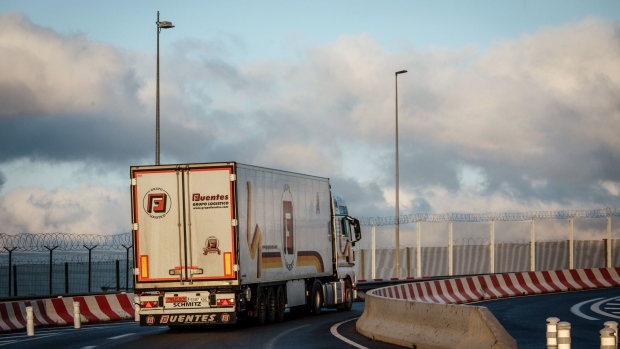Feb 14, 2023
EU Set to Fall Shy of Zero-Emission Target for Trucks by 2040
, Bloomberg News

(Bloomberg) -- The European Union’s executive branch proposed cutting emissions from trucks and buses by 90% within two decades as it tries to bring the major polluters in line with ambitious net zero goals.
The Commission wants all heavy-duty vehicles, both commercial and private, to reduce tailpipe emissions 45% by 2030 and then 65% by 2035, according to targets released Tuesday. New city buses will have to be zero-emission by 2030.
The standards are sure to disappoint countries and environmental groups pushing for a 100% reduction, like that agreed for cars last year, to drastically rein in a sector responsible for about a fifth of the bloc’s carbon dioxide emissions.
“In 2050, nearly all of the vehicles on our roads have to be zero emissions,” Frans Timmermans, the EU’s climate chief, said in a press conference. “All trucks and buses will have to head for a zero emissions future.”
Decarbonizing heavy vehicles is challenging because their weight makes them difficult to electrify, and hydrogen technologies are still at an early stage. Auto emissions have increased steadily since 2014 and are higher than those from the aviation and maritime sectors, the commission said.
“Trucks are still the easy-to-abate sectors, compared to planes and ships,” Bas Eickhout, a Green lawmaker in Parliament, said earlier on Tuesday. “So please, Commission, step up your game on trucks so we can really deliver on climate neutrality and innovation.”
The Netherlands — home to DAF Trucks NV, one of the largest European HDV manufacturers — Belgium, Denmark and Luxembourg called for a zero-emission target for new vehicles last month. Niche vehicles, like those used by fire services or garbage trucks, can receive an exemption to the rules.
Read more: EU Lawmakers Back Deal to Ban New Combustion-Engine Cars by 2035
Currently, truck manufacturers must ensure that emissions across their fleet are reduced 15% by 2025 and 30% by 2030, yet 99% of vehicles still run using combustion engines.
Separately, lawmakers gave their final blessing to an agreement on phasing out combustion engines in new cars by 2035.
Germany’s finance minister, Christian Lindner, said the EU had to keep open the option of retaining the combustion engine. In the rules for cars, there’s a review scheduled in 2026 to assess technology developments, like those for plug-in hybrids.
“Climate neutrality in mobility can also be achieved in the existing fleet, in new passenger cars, and in trucks and buses with e-fuels in the combustion engine,” Lindner tweeted.
--With assistance from Iain Rogers.
(Updates throughout with proposals being released, details of agreement on cars)
©2023 Bloomberg L.P.





